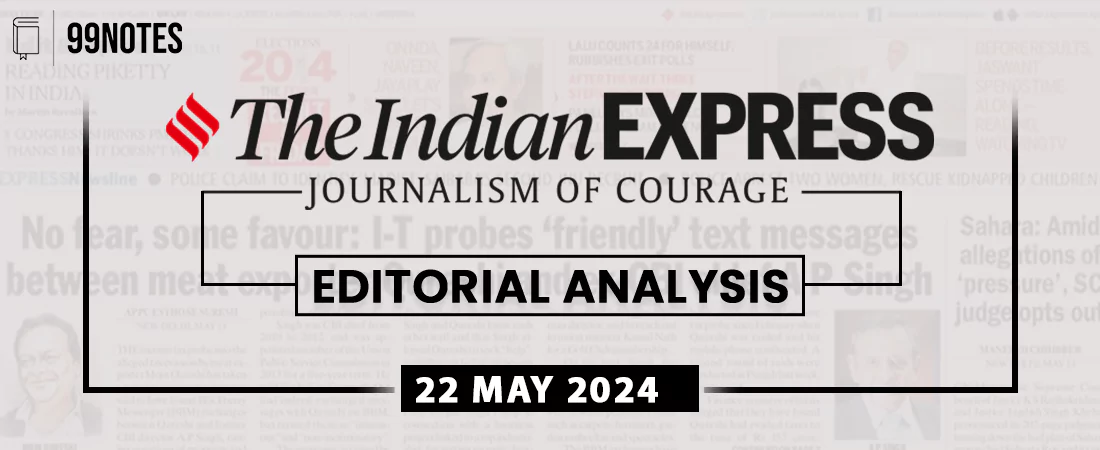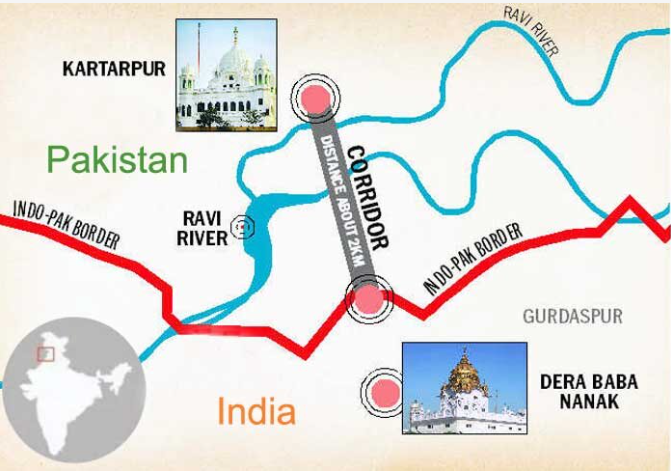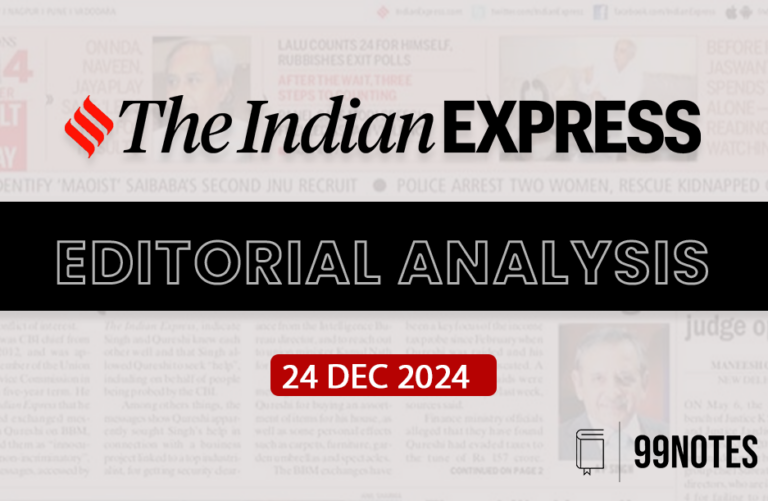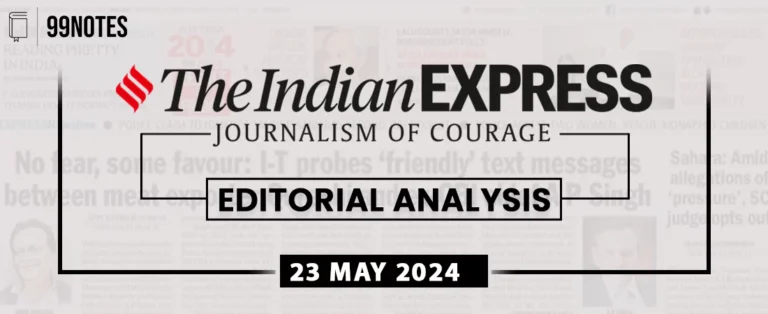22 May 2024 : Indian Express Editorial Analysis
1. A time for para diplomacy
| Topic: GS2 – International Relations – India and its neighbourhood |
| Context: |
|
About Kartarpur Sahib:
- Gurdwara Kartarpur Sahib, also known as the Gurdwara Darbar Sahib, is located in Pakistan’s Narowal district across river Ravi. It is one of the most significant historical and spiritual places for Sikhs.
- According to historians, the first Sikh Guru (Guru Nanak Dev) had arrived in Kartarpur between 1520 and 1522, and spent the last 18 years of his life there.
- It was in Kartarpur where he laid the foundations of a Sikh religion.
- The Kartarpur Corridor was thrown open in 2019.
Practical Challenges and Skepticism:
- Skeptics are quick to dismiss the feasibility of altering the territorial status quo along the Radcliffe Line in Punjab or reclaiming PoK, either peacefully or through force.
- The prospect of reopening territorial settlements in Punjab or extracting PoK from a nuclear-armed Pakistan is daunting. These tasks are fraught with complexities and potential for conflict, making them less practical.
- Instead, transforming these historically contentious frontiers from zones of military confrontation into areas of commercial cooperation presents a more attainable goal.
Cross-Border Trade and Economic Cooperation:
- The SAD also emphasizes the importance of cross-border trade with Pakistan, advocating for the reopening of the Attari and Hussainiwala borders for trade and tourism to promote economic prosperity.
- However, the major obstacle lies not with India but with Pakistan. The Pakistan Army has consistently shown little interest in economic cooperation with India, prioritizing the resolution of the Kashmir issue.
- Despite occasional signals of willingness to resume trade ties, such as during the February 2021 ceasefire negotiations, internal opposition in Pakistan often hinders these efforts.
Economic Zones and Para Diplomacy:
- One of the most intriguing proposals from the SAD is to transform the Punjab border into a “special economic zone” (SEZ).
- This concept aims to attract small and medium enterprises and foster economic integration across the border.
- If Pakistan were to establish a similar free zone on its side, it could pave the way for integrated development and improved bilateral relations.
- This approach mirrors successful examples of cross-border economic zones in Southeast Asia and China’s frontier provinces, where economic cooperation transcends political barriers.
The Role of Para Diplomacy:
- The SAD’s proposals highlight the potential of “para diplomacy” or “sub-state diplomacy” in enhancing national interests.
- This involves formal interactions between provincial and local governments across borders, often producing opportunities that national governments might miss due to entrenched positions.
- While federal governments typically guard their monopoly over foreign engagement, allowing sub-state entities to conduct diplomacy in coordination with the central government can open new avenues for cooperation.
Historical and Political Context:
- Historically, there have been instances where the chief ministers of East and West Punjab explored mutually beneficial cooperation.
- However, such initiatives often faltered due to the overarching conflict between India and Pakistan at the national level.
- The varied attitudes towards cross-border cooperation among Indian border states further complicate this dynamic.
- For example, West Bengal and Tamil Nadu have sometimes hindered Delhi’s engagement with Dhaka and Colombo, respectively.
Way Forward:
- For India’s neighborhood policy to succeed, it must align with the interests of people in border provinces through constructive collaboration between the central and regional governments.
- This necessitates a consensus-building approach, embracing para diplomacy as a strategic tool in India’s statecraft.
- As India looks to the future, the next government, regardless of its political orientation, should reconsider para diplomacy to foster more effective and inclusive neighborhood policies.
| About Kartarpur Corridor |
|
| PYQ: Terrorist activities and mutual distrust have clouded India-Pakistan relations. To what extent the use of soft power like sports and cultural exchanges could help generate goodwill between the two countries? Discuss with suitable examples. (200 words/12.5m) (UPSC CSE (M) GS-2 2015) |
| Practice Question: Discuss the challenges and opportunities associated with transforming the India-Pakistan border into a zone of economic cooperation. How can para diplomacy be leveraged to enhance bilateral relations between the two countries? (250 words/15 m) |
2. Humanity’s law
| Topic: GS2 – International Relations – Important International institutions, agencies and fora – their structure, mandate. |
| Context: |
|
What is ICC?
- Governed by an international treaty called ‘The Rome Statute’, the ICC is the world’s first permanent international criminal court.
- It investigates and, where warranted, tries individuals charged with the gravest crimes of concern to the international community: genocide, war crimes, crimes against humanity and the crime of aggression.
- Through international criminal justice, ICC aims to hold those responsible for their crimes and to help prevent these crimes from happening again.
- India is not a party to Rome Statute along with US and China.
How did it come into Being?
- On 17 July, 1998 Rome Statute was adopted by 120 States in direction of creating a more just world.
- On 1 July, 2002 Rome Statute took effect upon ratification by 60 states, officially establishing the ICC. Since it has no retroactive jurisdiction, the ICC deals with crimes committed on or after this date.
- After 2010 amendments – the Rome Statute also sets new standards for victims’ representation in the Courtroom, and ensures fair trials and the rights of the defence.
- Today the ‘Rome Statute’ serves as the ICC’s guiding legal instrument, which is elaborated in such other legal texts as the Elements of Crimes, Rules of Procedure and Evidence and more.
Skepticism Towards the ICC:
- There are valid reasons to be skeptical of the ICC. It has faced accusations of selective attention and has seen many of its rulings go unenforced, even by its member states.
- Notably, three of the five permanent members of the UN Security Council are not members of the ICC, and neither are other significant powers such as China, India, and the United States.
- The ICC’s broader legitimacy is frequently questioned, with concerns that it exercises undue power over smaller nations and their leaders. The fear is that legal actions might entrench parties in conflicts, reducing the likelihood of compromise.
- Despite these criticisms, the British prosecutor Karim Khan has presented a seemingly strong case for considering the arrest warrants.
Implications for Israel and International Law:
- The ICC prosecutor’s decision to seek arrest warrants is significant due to the context of skepticism surrounding the ICC.
- This action creates a high-stakes scenario, particularly as it implicates an Israeli Prime Minister, thus impacting Israel’s international reputation.
- Israel, asserting its right to self-defense, will likely reject the accusations, especially those suggesting its military operations in Gaza constitute a humanitarian catastrophe or genocide.
- The warrant, however, does not delve into the roots of the conflict but accuses both Israel and Hamas of violating the laws of armed conflict by targeting civilians and engaging in acts that could be classified as war crimes.
The Role of the United States and Global Reaction:
- The seeking of arrest warrants against a key ally of the United States, Israel, adds another layer of complexity.
- The United States has publicly condemned the ruling, and prominent senators have threatened sanctions against ICC officials.
- This reaction underscores a broader issue: while the U.S. welcomes ICC actions against adversaries like Putin, it strongly opposes similar actions against its allies.
- This contradictory stance highlights the challenges the ICC faces in maintaining its legitimacy and authority.
Obligations of ICC Member States:
- ICC member states are obliged not only to execute its warrants but also to defend the ICC against external intimidation. This situation places U.S. allies in a difficult position.
- Unlike the International Court of Justice, which deals with state-to-state disputes, the ICC prosecutes individuals. The current situation sends a strong message about the moral limits that must be recognized in political conflicts.
- However, it also risks entrenching the positions of both Israel and Hamas, potentially making humanitarian aid and hostage negotiations more difficult.
The Broader Impact on International Order:
- The broader international reaction to the ICC’s actions is likely to reflect global cynicism towards the rule of law.
- Major powers and regional actors, including the U.S. and various Arab states, have shown limited willingness to intervene constructively in the conflict.
- The ICC’s move, while highlighting the lack of moral accountability among states, may exacerbate this cynicism rather than resolve it. Nonetheless, the ICC’s actions force a reckoning, showing that no state can completely evade moral scrutiny.
Conclusion:
- The ICC’s decision to seek arrest warrants against high-profile leaders from both Israel and Hamas is a bold step that challenges the existing international order.
- While it may entrench current positions and provoke significant backlash, it also underscores the need for a universal application of humanitarian law, transcending political and national biases.
- This move could ultimately catalyze a broader discussion about the role of international law in resolving deeply entrenched conflicts.
| What are the Limitations of ICC? |
How is ICC Different from ICJ?
|
| Practice Question: Discuss the significance and potential consequences of the ICC prosecutor seeking arrest warrants for Israeli and Hamas leaders. How does this action impact the legitimacy of the ICC and international law? (250 words/15 m) |


 The Kartarpur corridor connects the Darbar Sahib Gurdwara in Narowal district of Pakistan with the Dera Baba Nanak shrine in Gurdaspur district Punjab, India.
The Kartarpur corridor connects the Darbar Sahib Gurdwara in Narowal district of Pakistan with the Dera Baba Nanak shrine in Gurdaspur district Punjab, India.

